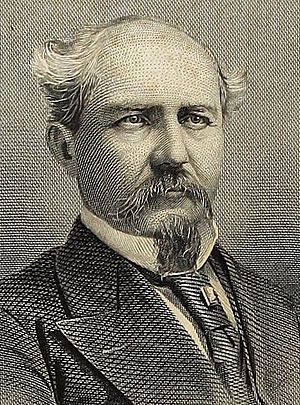Michael P. O'Connor facts for kids
For the Michael Patrick O'Connor who was an Irish doctor, author and broadcaster, see Michael P. O'Connor (writer)
Quick facts for kids
Michael Patrick O'Connor
|
|
|---|---|

Frontispiece of 1882's Memorial Addresses on the Life and Character of Michael P. O'Connor, a Representative from South Carolina
|
|
| Member of the U.S. House of Representatives from South Carolina's 2nd district |
|
| In office March 4, 1879 – April 26, 1881 |
|
| Preceded by | Richard H. Cain |
| Succeeded by | Edmund W.M. Mackey |
| Member of the South Carolina House of Representatives from St. Philip's and St. Michael's Parish | |
| In office November 22, 1858 – December 23, 1864 |
|
| Personal details | |
| Born | September 29, 1831 Beaufort, South Carolina |
| Died | April 26, 1881 (aged 49) Charleston, South Carolina |
| Political party | Democratic |
| Alma mater | St. John's College |
| Profession | Attorney, politician |
| Military service | |
| Allegiance | |
| Branch/service | |
| Years of service | 1861-1865 |
| Rank | Lieutenant |
Michael Patrick O'Connor (September 29, 1831 – April 26, 1881) was a U.S. Representative from South Carolina.
Early life
Born in Beaufort, South Carolina, O'Connor attended the public schools and was graduated from St. John's College, Fordham, New York, in 1850. He studied law, was admitted to the bar in 1854 and commenced practice in Charleston, South Carolina. During the Civil War, he served in the Confederate military as a lieutenant in the Lafayette Light Artillery.
Political career
He served as member of the South Carolina House of Representatives 1858-1866. He served as delegate to the Democratic National Conventions in 1872 and 1876. He argued against secession in the state house of representatives.
He was an unsuccessful candidate for election in 1874 to the Forty-fourth and in 1876 to the Forty-fifth Congresses, but was elected as a Democrat to the Forty-sixth Congress (March 4, 1879 – March 3, 1881). He received credentials as a Member-elect to the Forty-seventh Congress, but died, pending a contest by Edmund W.M. Mackey (which subsequently resulted successfully for the contestant), in Charleston, South Carolina, April 26, 1881. He was interred in St. Lawrence Cemetery.

